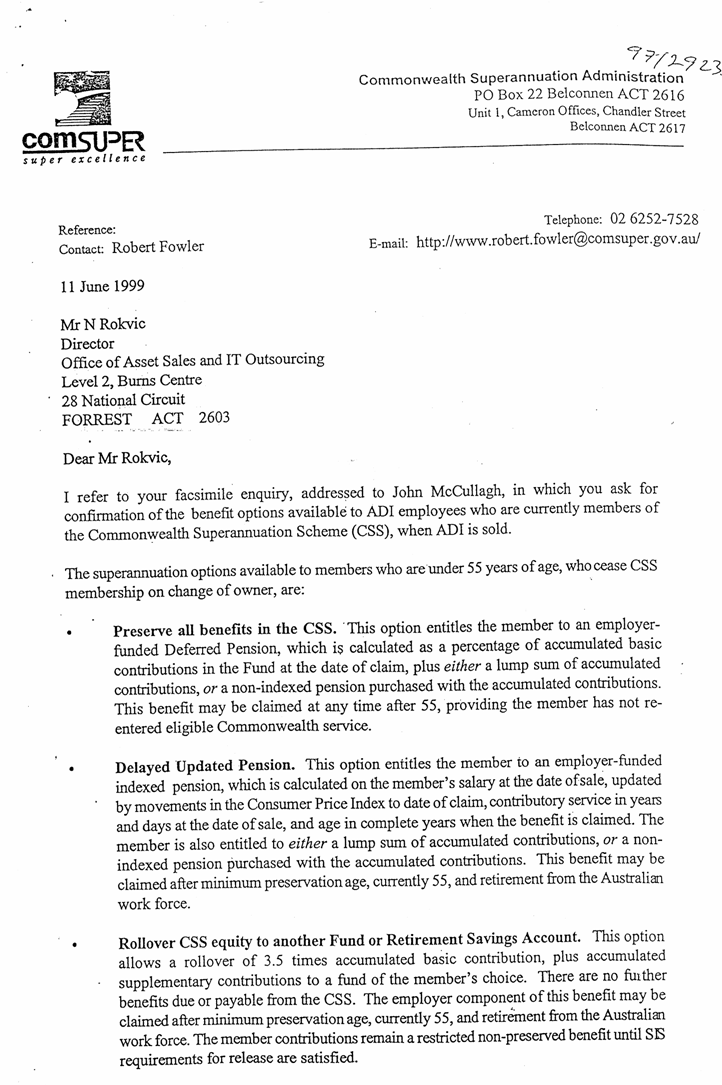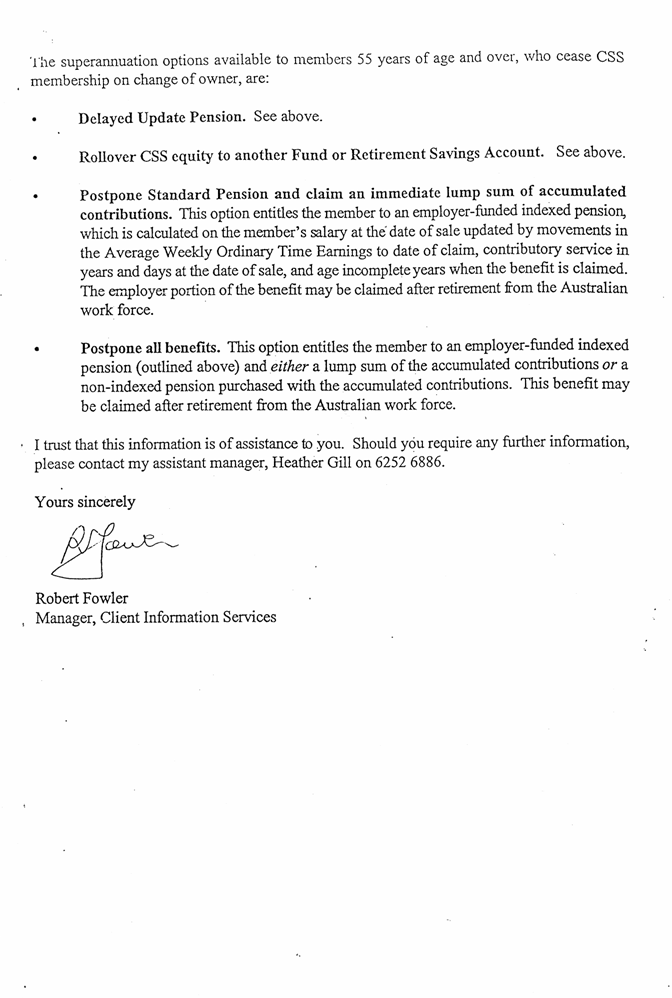Appendix 3 - Information on superannuation which was provided to Oasito by the Commonwealth superannuation group, Department of Finance and Administration
Senate
Foreign Affairs, Defence and Trade References Committee
Answers
to questions on notice - Supplementary Hearing - 29 November 1999
Office of Asset Sales & IT Outsourcing
Senator Hogg asked (Hansard 29 November 99 page FAD&T 180):
Can you make available advice provided by the
superannuation people in the Department of Finance and Administration in
respect of superannuation?
Answer:
The following
information was provided to OASITO by the Commonwealth Superannuation Group,
Department of Finance and Administration.
CSS/PSS benefits on separation for
employees affected by a sale, transfer or outsourcing.
The following
comments are intended to provide a broad outline of the benefit options that
apply to employees affected by a sale, transfer or outsourcing of an agency.
Before CSS/PSS
members affected by a sale, transfer or outsourcing of an agency
take any action or make any election in respect of superannuation, members are
strongly advised to seek specific information based on their own individual
circumstances. Employees could seek counselling from ComSuper with regards to
any special circumstances that may apply in individual cases and they should
also look at the ComSuper publications CSS Your Super Scheme and PSS The
Super Book. Reference should also be made to the appropriate superannuation
rules and
legislation. This paper is not a substitute for the CSS and PSS rules and
legislation.
Post 1 July 2000
From 1 July 2000 the CSS/PSS arrangements will require
that members preserve at least the employer financed component of all lumpsum
benefits before minimum retirement age.
Permanent,
Temporary or Fixed -Term Contract Employees?
The provisions
set out below apply equally to all types of employees, including employees on a
fixed term contract who have not completed their contract at the time of the
sale, transfer or outsourcing event. The rules for the PSS and CSS provide that
where the contract of employment differs from 'normal' superannuation
arrangements, the provisions in the contract will normally apply.
Superannuation
Industry (Supervision) Act 1993 (SIS Act)
The SIS Act
prescribes prudential and operating standards for superannuation funds and
these standards can affect the benefit options available to an individual
involved
in a sale, transfer or outsourcing process. For example, SIS does not allow a
cash in hand payment of
superannuation benefits (eg. lump sum, pension, etc.) when there is a change of
owner and not a change of employer, as occurs when there is a sale of shares. The
SIS Act also sets out the minimum preservation requirements. Prior to 1 July 1999 the minimum amount of CSS and PSS
benefits which had to be preserved under SIS was equivalent to the
Superannuation Guarantee (SG) minimum benefit. However, changes to the SIS
preservation rules and scheme specific rules (eg CSS/PSS rules) may mean that
more than that required under SIS will be required to be preserved.
Options
available on sale, transfer or outsourcing when there is a change of owner but
no change in employer
Where the
employee continues in employment when there is no change of employer, (eg. when
the Commonwealth sells shares in an organisation), the member has the following
options:
Table Sale, Transfer or Outsourcing Options
CSS |
PSS |
|
Rollover
option*
Employees who are:
required to cease CSS membership in
circumstances connected with a sale, transfer
or outsourcing; and
are under 55
may
rollover an amount equal to the total
involuntary retirement (redundancy) lump
sum benefit
|
Rollover
option*
Employees who are:
required to cease PSS membership in
Circumstances connected with a sale, transfer
or outsourcing; and
are under 55
May
rollover an amount equal to the total
involuntary retirement (redundancy) lump
sum benefit.
|
|
Preserve
the total benefit
Benefit entitlement can be preserved in the
scheme until at least minimum retiring age (or
earlier, in cases of invalidity retirement or
death).
In a sale, transfer or outsourcing two
preservation options are available:
Standard preservation - (Available if under
minimum retiring age) CPI indexed pension
based on 2.5 times members basic
contributions plus interest earned until
commencing pension. Plus payment of
accrued member and productivity benefit,
which maybe received as an non-indexed
pension. |
Preserve
the total benefit
Total benefit entitlement is preserved in the
scheme until at least age 55 and leaving the
workforce (or earlier, in cases of invalidity
retirement or death). Member and
productivity component continue to earn
interest. Remaining employer financed
component increased in line with CPI. |
|
Delayed Updated Pension (DUP) -
(available irrespective of age) provides a CPI indexed pension on retirement
from the work force after age 55 based on salary and length
of scheme membership as at the sale, transfer or outsourcing day. The age at
retirement
from the workforce is used to assess the pension factor and the member's
final salary
is updated by CPI from sale, transfer or outsourcing day to retirement. Plus
payment
of accrued member and productivity component, which maybe received as an
non-indexed pension. |
|
|
Postpone the benefit
Available if minimum retiring age or greater,
but under age
65. (If over age 65 benefit
must be taken immediately.)
Postpone CPI indexed pension and own contributions
plus interest and productivity contributions and interest until retirement
from the work force. |
Postpone the benefit
Not available
|
OASITO suggests
that the Committee may be assisted by the attached ComSuper advice dated 11 June 1999 confirming the options available to
ADI CSS members.


Senate Foreign Affairs, Defence and Trade References Committee
Answers to questions on notice - Supplementary Hearing - 29 November 1999
Office of Asset Sales & IT
Outsourcing
Senator Hogg asked (Hansard 29 November 99 page FAD&T 180):
Provide criteria established for the standard
application of established superannuation law and rules.
Answer:
Former Commonwealth
employees who transferred to ADI on its establishment were able to remain
members of the Commonwealth Superannuation Scheme (CSS) because ADI was an
approved authority under the Superannuation Act 1976 (the Act). ADI
ceased to be an approved authority under the Act on sale date (29 November 1999). An extract of the Act,
defining an 'approved authority' is set out below.
Part I
Preliminary
Section 3
Superannuation Act 1976
approved
authority means:
- an
authority or other body that is declared by the Minister to be an approved
authority for the purposes of this Act and is:
- a body corporate incorporated, whether before or
after the commencement of this Act, for a public purpose by an Act, regulations
made under an Act or a law of a Territory; or
- an authority or body, not being a body
corporate, established, whether before or after the commencement of this Act,
for a public purpose by, or in accordance with the provisions of, an Act,
regulations made under an Act or a law of a Territory; or
- a company or other body
corporate incorporated, whether before or after the commencement of this Act,
under a law of the Commonwealth or of a State or Territory, being a. body
corporate in which the. Commonwealth has a controlling interest; or
- an authority or body established, whether before
or after the commencement of this Act, and whether by or in accordance with the
provisions of an Act, regulations made under an Act or a law of a Territory or
otherwise, and whether a body corporate or not, being an authority or body
which is financed in whole or in substantial part, either directly or
indirectly, by moneys provided by the Commonwealth; or
- a company or other body corporate incorporated,
whether before or after the commencement of this subparagraph, under an Act or
a law of a State or Territory, being a company or body corporate in which:
- an authority or body referred to in subparagraph
(i), (ii), (iii) or (iv), or that is an approved authority because of paragraph
(b), has; or
- the Commonwealth and one, or more than one, such
authority or together have; or
- 2 or more such authorities or bodies together
have;
a controlling interest; or
- an
authority or body that, immediately before the commencement of this Act, was an
approved authority for the purposes of the superseded Act other than such an
authority or body in relation to which a declaration under subsection (2A) is
in force.
Navigation: Previous Page | Contents